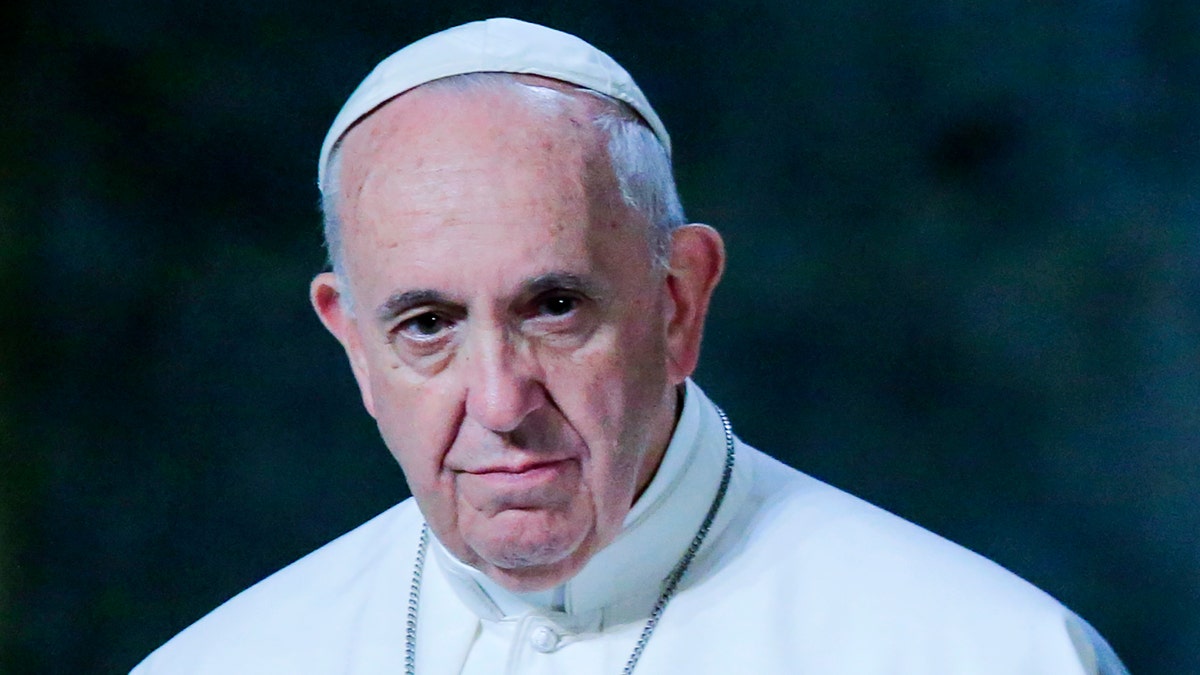
Pope Francis attends a ceremony inside the 9/11 Museum, Friday, Sept. 25, 2015 in New York. Pope Francis is on a five-day trip to the United States. (Eduardo Munoz/Pool Photo via AP)
It was all so surreal.
Thursday a Catholic Pope entered the chamber of the House of Representatives and gave a speech to a joint meeting of Congress urging those in attendance to apply Catholic social teaching to the affairs of the nation.
For most 18th and 19th century Americans the prospect of a person landing on the moon would have been more believable.
And not only did the pope speak, but he was flanked by a Vice-President and Speaker of the House who shared his faith. The presence of Joe Biden and John Boehner proves that the United States has come a long way in accepting Catholics.
The historical irony cannot be overlooked. Think, for example, about the first Vice-President to occupy Biden’s chair in the House. John Adams, the son of New England Puritans, was no fan of Catholics, especially Jesuits, the order of Pope Francis. In 1814, in a letter to Thomas Jefferson, Adams wrote, “If ever any Congregation of Men could merit, eternal Perdition on Earth and Hell…it is the company of Loyola.”
Adams and most of his fellow founding fathers believed that American liberty and what he called “Popery” were incompatible. He thought that Catholicism was a tyrannical religious system that required its followers to pay ultimate homage to the Pope. Catholicism’s “religious authority in the Western world, including its incomprehensible power of creating out of bread and wine the flesh and blood of God himself,” Adams once said, kept “human nature chained fast for ages in cruel, shameful, and deplorable servitude to him [the Pope], and his subordinate tyrants.”
This spirit of anti-Catholicism was present in the United States well into the twentieth-century. The underlying prejudices toward Catholics explain why the United States has only had one Catholic President (John Kennedy) and one Catholic Vice President (Biden).
The anti-Catholicism of earlier generations has waned. The chances of the United States having another Catholic President are strong But the Pope’s visit this week reveals that Protestant and secular America still do not understand the way the Catholic Church approaches public life.
Pundits and commentators insist on trying to comprehend Francis’s message in political terms. This is a wrongheaded approach. The Pope is not liberal or conservative. He is not a Democrat or Republican. He is a Catholic. And whatever he says about politics, culture, or the economy stems from this identity.
Our propensity for trying to place the Pope in a political box says more about our culture than it does about the social views of the Catholic Church. Francis's visit has called attention to the tired, unimaginative, and intellectually stale way that we Americans think about public life. Americans are captive to ideological categories like "Left: and "Right." They are captive to political parties that allow little original thought that does not conform to rigid and limited platforms.
And we have being thinking in these binary terms for a long time. Anyone who has seen the hit Broadway musical Hamilton will realize that this political habit has been around since the 1790s when Hamilton and Jefferson planted the roots of what would become our modern party system.
It should thus not surprise us that so many Americans cannot make sense of Francis and his message. Marxists were criticized for thinking about the world in solely economic terms. Americans should be criticized for thinking about the world solely in political terms. When people agree with what the Pope is saying they describe him as a "spiritual leader," but when they disagree with his views they say he is "getting too political."
Thursday in the House chamber Francis pushed Americans to move beyond these unbending categories. He said that life is complex. He urged us to avoid demonizing those with whom we disagree. Common ground is possible, but it will require a different way of thinking about the moral issues that often define our politics.
Are we ready for this?
The pope’s message is going to be a hard sell in our polarized culture. According to one commentator, if Francis can get the members of Congress to embrace his ideas it would be something akin to a miracle, and the Pope would be well on his way toward canonization as a Catholic saint!
Francis is pro-life and believes marriage is between and a man and a woman. He has called abortion a "sin," but he has also said that those who have committed this "sin" deserve forgiveness. He believes in climate change. He is a critic of capitalism (or any political system for that matter) when it leads to conspicuous consumption, materialism, and injustice.
He sides with the poor over the rich because this is what Jesus did. He fights for life because Catholics believes that all human beings are created in God’s image and have dignity and worth.
When Francis talks about these things, he is not being "political." Catholicism is not just a religion--it is an all-encompassing way of making sense of the world that is informed by the Bible and the traditional teachings of the church over the centuries.
John Fea teaches history and chairs the History Department at Messiah College in Mechanicsburg, Pennsylvania. He blogs daily at www.philipvickersfithian.com and is the author of "Was America Founded as a Christian Nation?: A Historical Introduction."
